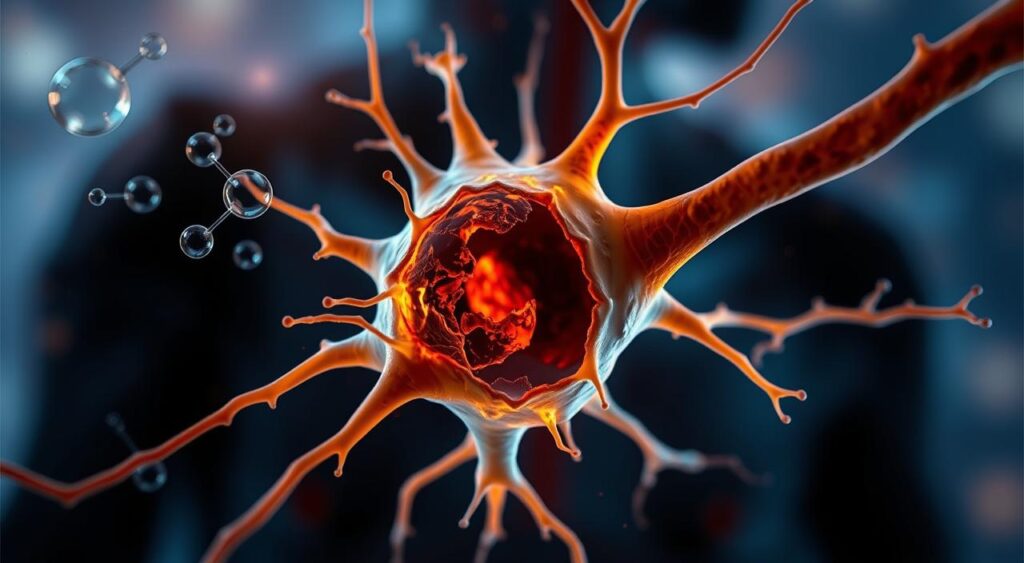About 25% of people with alcoholic and nutritional neuropathy face significant nerve damage. This shows how vital it is to know the causes and treatments. This condition harms nerves due to alcohol misuse or bad nutrition, causing nerve damage and health issues. To treat it well, we need to tackle its root causes.

Spotting the signs of alcoholic and nutritional neuropathy is key to getting help on time. Knowing how to treat it helps people avoid nerve damage and manage their health better. If not treated, this condition can lead to serious problems, making quick medical care and right treatments crucial.
Key Takeaways
- Alcoholic and nutritional neuropathy is a serious healthcare issue that affects the nerves due to alcohol abuse or poor nutrition.
- Understanding the causes and treatments of this condition is crucial for effective management and prevention of nerve damage.
- Recognizing the signs and symptoms of alcoholic and nutritional neuropathy is essential for timely intervention and treatment.
- Alcoholic and nutritional neuropathy can have severe consequences if left untreated, emphasizing the need for prompt medical attention.
- Effective treatments for alcoholic and nutritional neuropathy require a comprehensive approach that addresses the underlying causes of the condition.
- Prevention and lifestyle modifications, such as dietary changes and alcohol cessation, can help prevent nerve damage and manage alcoholic and nutritional neuropathy.
Understanding Alcoholic and Nutritional Neuropathy
Alcoholic and nutritional neuropathy harms the nerves, often due to drinking too much or not eating right. It’s key to know what neuropathy is and how it works. Many people face this issue because of bad diets, too much drinking, and health problems.
This condition makes nerves break down. Symptoms can be mild or severe, like feeling numb, tingly, or in pain. Getting a correct diagnosis is important. Doctors use physical checks, lab tests, and nerve studies to figure it out.
Important things to know about alcoholic and nutritional neuropathy include:
- Risk factors: poor diet, excessive alcohol consumption, certain medical conditions
- Prevalence: significant number of individuals affected
- Symptoms: numbness, tingling, pain in affected areas
- Diagnosis: physical examinations, laboratory tests, nerve conduction studies
Learning about definition, basic concepts, and risk factors helps. It lets people take steps to avoid or manage it. This can greatly improve their health and happiness.
| Condition | Causes | Symptoms | Diagnosis |
|---|---|---|---|
| Alcoholic Neuropathy | Excessive alcohol consumption | Numbness, tingling, pain | Physical examinations, laboratory tests |
| Nutritional Neuropathy | Poor diet, nutritional deficiencies | Numbness, tingling, pain | Physical examinations, laboratory tests |
The Role of Alcohol in Nerve Damage
Alcohol abuse can harm nerves directly and cause nutritional deficiencies. These issues worsen neuropathy. Nerve damage from alcohol leads to numbness, tingling, and pain in hands and feet.
People with alcohol-related neuropathy may have trouble walking and balancing. They might also struggle with thinking clearly. Treatment options include stopping alcohol use and taking medicines to manage symptoms and prevent more nerve damage.
Some common treatment options for alcohol-related neuropathy include:
- Medications to manage pain and other symptoms
- Vitamin supplements to address nutritional deficiencies
- Physical therapy to improve mobility and balance
Along with these treatment options, people with alcohol-related neuropathy may need to tackle malnutrition or other health issues. Getting medical help and following a detailed treatment plan can help. This way, they can lower the risk of long-term nerve damage and improve their health and well-being.
Nutritional Deficiencies and Nerve Health
Nutritional deficiencies can harm nerve health, causing neuropathy. A balanced diet with essential vitamins is key for healthy nerves. Lack of vitamins B12, B6, and E can damage nerves and raise neuropathy risk.
Preventing nerve health issues starts with a balanced diet. Foods rich in vitamins like leafy greens, nuts, and whole grains are important. Malnutrition can severely harm nerves, making a healthy diet crucial.
Essential Vitamins for Nerve Function
Some vitamins are vital for nerve health. Vitamin B12 helps make myelin, the fatty substance around nerves. Vitamin B6 helps nerves work right. Not having enough of these vitamins can damage nerves and raise neuropathy risk.
Impact of Malnutrition
Malnutrition can badly hurt nerve health, leading to neuropathy. A diet lacking in vitamins and nutrients can damage nerves. This can cause numbness, tingling, and pain. It’s vital to eat well to avoid malnutrition and keep nerves healthy.
Common Nutritional Deficiencies
Common deficiencies that harm nerves include vitamin B12, B6, and E lack. These can come from a bad diet, health issues, or some meds. Knowing these and preventing them is key, like eating right and using supplements if needed.
Recognizing the Signs and Symptoms
It’s important to spot signs and symptoms early for neuropathy diagnosis and treatment. Common signs include numbness, tingling, and pain. These can change based on the cause and nerves involved. Muscle weakness can also happen, making daily tasks hard.
Some people face autonomic dysfunction, affecting blood pressure, digestion, and bladder control. Neuropathy symptoms can be mild or severe. They might come on slowly or suddenly. If you notice unusual sensations or trouble with movement or balance, see a doctor.
Neuropathy symptoms can look like other conditions, making diagnosis tricky. A detailed medical check, including a physical exam and lab tests, is needed. Knowing the signs and symptoms is key for early diagnosis and treatment. This can help ease symptoms and boost your quality of life.
- Numbness or tingling in the hands and feet
- Pain or burning sensations
- Muscle weakness or cramps
- Difficulty with balance or coordination
By recognizing neuropathy signs and symptoms, you can get medical help quickly. This leads to a better diagnosis and treatment plan. It can help manage symptoms, slow disease progress, and improve your health.
Diagnostic Approaches and Testing Methods
Diagnosing neuropathy requires a mix of methods to find the cause and see how much nerve damage there is. A physical check-up is usually the first step. It lets doctors check muscle strength, reflexes, and how sensitive you are.
Doctors might use pinprick tests and vibration tests during the physical check-up. They also might do blood tests to look for things like diabetes or vitamin shortages. Nerve conduction studies help find out if nerves are damaged by checking how signals move through them.
Here are some common ways doctors figure out what’s wrong with your nerves:
- Physical examination procedures
- Laboratory tests, such as blood tests and urinalysis
- Nerve conduction studies
Doctors use these methods together to find out why you have neuropathy and how to treat it. Finding and treating it early can make symptoms better and stop more damage.
| Diagnostic Approach | Description |
|---|---|
| Physical Examination | Evaluation of muscle strength, reflexes, and sensation |
| Laboratory Tests | Blood tests and urinalysis to check for underlying conditions |
| Nerve Conduction Studies | Measurement of electrical signals in nerves to diagnose nerve damage |
Treatment Strategies and Recovery Options
Effective treatment for alcoholic and nutritional neuropathy combines managing symptoms and addressing the root cause. The aim is to reduce pain, improve life quality, and boost function. Various treatment strategies exist, like medication, physical therapy, and dietary changes.
Stopping alcohol use is key to recovery, as drinking can worsen nerve damage. Eating a balanced diet, especially one rich in B vitamins, is crucial for nerve health. Vitamin B12 supplements may also be suggested to support nerve health.
Important treatment strategies include:
- Medication to manage pain, numbness, and tingling
- Physical therapy to improve mobility and strength
- Dietary changes to ensure adequate nutrition and prevent further nerve damage
- Alcohol cessation support to address underlying addiction
By taking a holistic approach to management and recovery options, people can manage their condition well. This reduces symptoms and boosts overall health. It’s vital to work with a healthcare provider to create a tailored treatment plan that meets individual needs and promotes nerve health.

Prevention and Lifestyle Modifications
To prevent or manage neuropathy, making lifestyle changes is key. Eating a diet full of vitamins and minerals is crucial. This helps keep nerves healthy and can prevent neuropathy.
Also, stopping alcohol use is important for those who drink too much. Alcohol can harm nerves and make neuropathy worse. Getting help from professionals and joining support groups can help you stop drinking. Taking supplements can also help, but always talk to a doctor first.
Here are some important lifestyle changes to prevent neuropathy:
- Eat a balanced diet
- Don’t drink too much alcohol
- Stop smoking
- Exercise regularly
By making these changes and making smart choices, you can lower your risk of getting neuropathy. Or, if you already have it, you can slow it down. Always talk to a doctor to find the best plan for you.
| Prevention Strategy | Description |
|---|---|
| Dietary Recommendations | A well-balanced diet rich in essential vitamins and minerals |
| Alcohol Cessation | Seeking professional help and support groups to aid in cessation |
| Supplementation | Consulting with a healthcare professional before adding supplements to your regimen |
Long-term Management and Prognosis
Managing neuropathy long-term means ongoing care and watching for complications. Regular visits to a healthcare provider are key. They help track the condition’s progress and tweak treatment plans as needed.
The prognosis for those with alcoholic and nutritional neuropathy depends on the condition’s severity and treatment success. With the right healthcare and management, it’s possible to slow or stop the condition’s progression. This can greatly improve one’s quality of life.
Important aspects of long-term management include:
- Regular monitoring of nerve function and symptoms
- Adjusting treatment plans as needed to manage symptoms and prevent complications
- Maintaining a healthy lifestyle, including a balanced diet and regular exercise
- Seeking support from healthcare providers and support groups to manage the emotional and psychological aspects of the condition

By focusing on healthcare and being proactive in long-term management, people with alcoholic and nutritional neuropathy can lower their risk of complications. This can also improve their overall prognosis.
| Factor | Importance | Description |
|---|---|---|
| Regular monitoring | High | Regular check-ups with a healthcare provider to assess the progression of the condition |
| Treatment plan adjustments | Medium | Adjusting treatment plans as needed to manage symptoms and prevent complications |
| Healthy lifestyle | High | Maintaining a balanced diet and regular exercise to support overall health |
Conclusion
Managing alcoholic and nutritional neuropathy requires a detailed plan. It’s important to understand the condition, its causes, and the need for early diagnosis. The article’s key points stress the importance of proper treatment and lifestyle changes.
It’s crucial to know how alcohol and nutritional deficiencies harm nerves. Following dietary advice and taking supplements can help. Taking these steps can prevent and manage neuropathy. Research and new treatments are on the horizon, offering hope for better care.
Looking ahead, education and awareness about neuropathy are key. This will help people get the support they need. By focusing on these areas, we can improve care for those with this condition.
FAQ
Q: What is alcoholic and nutritional neuropathy?
A: Alcoholic and nutritional neuropathy is nerve damage caused by alcohol or poor nutrition. It leads to numbness, tingling, and pain. Knowing the causes and treatments is key to managing and preventing it.
Q: What are the common symptoms of neuropathy?
A: Symptoms include numbness, tingling, pain, and muscle weakness. These vary based on the cause and nerves affected. Spotting these signs early is crucial for treatment.
Q: How is neuropathy diagnosed?
A: Diagnosing involves physical exams, lab tests, and nerve studies. These steps confirm the diagnosis and measure nerve damage.
Q: What are the treatment options for neuropathy?
A: Treatment aims to fix the cause, manage symptoms, and prevent further damage. It includes medication, physical therapy, diet changes, and stopping alcohol use. These steps are vital for recovery.
Q: Can neuropathy be prevented?
A: Yes, by making lifestyle changes. This includes healthy eating, quitting alcohol, and supplements to avoid nutritional deficiencies. These steps help prevent and manage neuropathy.
Q: What is the prognosis for individuals with neuropathy?
A: The outcome depends on the cause and damage level. With proper care, symptoms can improve, enhancing quality of life. Ongoing healthcare is key.
Q: What are the complications of neuropathy?
A: Complications include chronic pain, muscle weakness, and disability. These can greatly affect life quality. Understanding these risks is vital for management and prevention.
Q: How can I manage neuropathy?
A: Managing involves medication, therapy, diet changes, and lifestyle adjustments. Quitting alcohol and supplements are important. A healthcare team can help create a management plan.
Q: What role does nutrition play in neuropathy?
A: Nutrition is crucial as deficiencies in B12, B6, and E can harm nerves. A balanced diet and supplements can help prevent or manage neuropathy. Dietary advice and lifestyle changes are essential.
